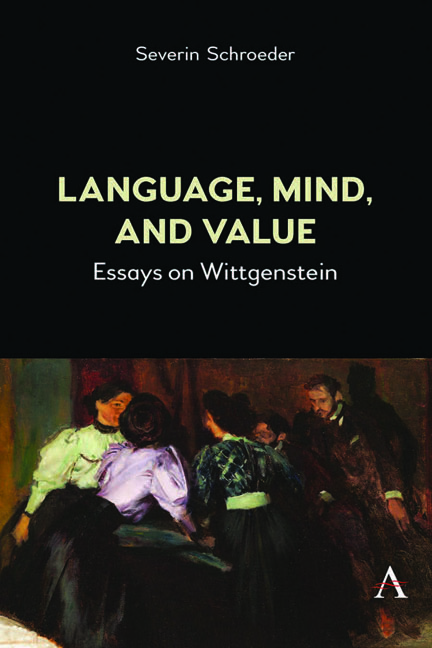Preface
Published online by Cambridge University Press: 13 April 2024
Summary
Over the last 17 years, I have written a number of essays on important topics in Wittgenstein's philosophy not covered in my earlier book Wittgenstein: The Way Out of the Fly-Bottle (Polity 2006). I have collected them together in this volume, loosely grouped into three thematic sections: language, mind, and value.
Language
The 1st essay ‘Wittgenstein on Grammar, Rules, and Norms’, describes Wittgenstein's concept of grammar as a system of rules determining linguistic meaning and considers, and to some extent defends, his key claim that grammar is autonomous, that is, not determined by reality. Then, I follow the development of Wittgenstein's view of linguistic rules and introduce the distinction between rules and norms. Furthermore, the role of the rulefollowing considerations in Wittgenstein's philosophy is explained, and the final section offers a brief account of Wittgenstein's view of mathematics as grammar.
In the 2nd essay, ‘Analytic Truths and Grammatical Statements’, I defend the traditional account of analytic truth as truth by virtue of meaning against eight current objections. In the second part of the essay, the concept of an analytic statement is compared with Wittgenstein's concept of a grammatical proposition.
Essay 3, ‘Semantic Normativity and Moral Obligation’, offers a brief sketch of the normativity of linguistic meaning, which is central to Wittgenstein's philosophy of language, and then considers the opposing view of semantic antinormativism as defended by Kathrin Glüer and Åsa Wickforss. I distinguish between three different types of obligation (moral obligation, socially enforced obligation, and freely adopted obligation) and argue that Glüer & Wickforss's position is based on a misconstrual of semantic normativity as a source of something like moral obligation, when in fact it produces only obligation of the third type.
Essay 4 presents a Wittgensteinian dissolution of the Liar Paradox. It is argued that the crucial flaw in the Liar paradox is the lack of propositional content. Hence, the conflict between truth and falsity is only apparent since it never gets to the point of an actual statement that might be true or false. The so-called Strengthened Liar suffers from the same lack of propositional content, which should be reason enough not to worry about it. However, defective as it is, it seems correctly to indicate its own defectiveness.
- Type
- Chapter
- Information
- Language, Mind, and ValueEssays on Wittgenstein, pp. vii - xiiPublisher: Anthem PressPrint publication year: 2024

